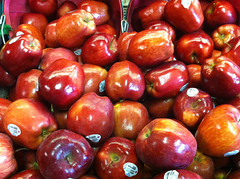The Story of Johnny Appleseed
Today, September 26th, is the birthday of
Jonathan Chapman (1774-1845). Today we
know him as Johnny Appleseed. In
elementary school you probably learned about how he travelled across the
American Midwest in the early frontier days planting apples trees for settlers,
but his story is a bit more surprising than that.
The popular image is of Johnny Appleseed spreading apple
seeds randomly, everywhere he went. In
fact, he planted nurseries, built fences around them to protect them from
livestock, left the nurseries in the care of a neighbor who sold trees on
shares, and returned every year or two to tend the nursery. Although apples grown from seed are rarely
sweet or tasty, apple orchards with sour apples were popular among the settlers
because apples were mainly used for producing hard cider and apple jack
(distilled hard cider). In some periods
of the settlement of the Midwest, settlers were required by law to plant
orchards of apples and pears in order to uphold the right to the claimed land. For these reasons, Johnny Appleseed planted
orchards made for popular real estate on the frontier. His first nursery was planted on the bank of
Brokenstraw Creek, South of Warren, Pennsylvania. Next, he seems to have moved to Venango County
along the shore of French Creek, but many of these nurseries were located in
the Mohican area of north-central Ohio. This area included the towns of Mansfield,
Lucas, Perrysville, and Loudonville.
He would tell stories to children, spread the gospel to the
adults, receiving a floor to sleep on for the night, sometimes supper in
return. "We can hear him read now,
just as he did that summer day, when we were busy quilting upstairs, and he lay
near the door, his voice rising denunciatory and thrilling—strong and loud as
the roar of wind and waves, then soft and soothing as the balmy airs that
quivered the morning-glory leaves about his gray beard. His was a strange eloquence at times, and he
was undoubtedly a man of genius," reported a lady who knew him in his
later years. He made several trips back
east, both to visit his sister and to replenish his supply of literature.
Chapman was quick to preach the Gospel as he traveled, and
during his travels he converted many Indians, whom he admired. The Native Americans regarded him as someone
who had been touched by the Great Spirit; even hostile tribes left him strictly
alone. He once wrote, "I have
traveled more than 4,000 miles about this country, and I have never met with
one single insolent Native American."
Fort Wayne, Indiana is the location where Johnny Appleseed
died. A memorial in Fort Wayne's Swinney
Park purports to honor him but not to mark his grave (the exact place of his
grave is unknown). In Fort Wayne, since
1975, the Johnny Appleseed Festival is held the third full weekend in September
in Johnny Appleseed Park and Archer Park. Musicians, demonstrators, and vendors dress in
early 19th century attire, and offer food and beverages that would have been
available then.


